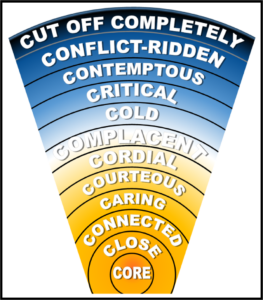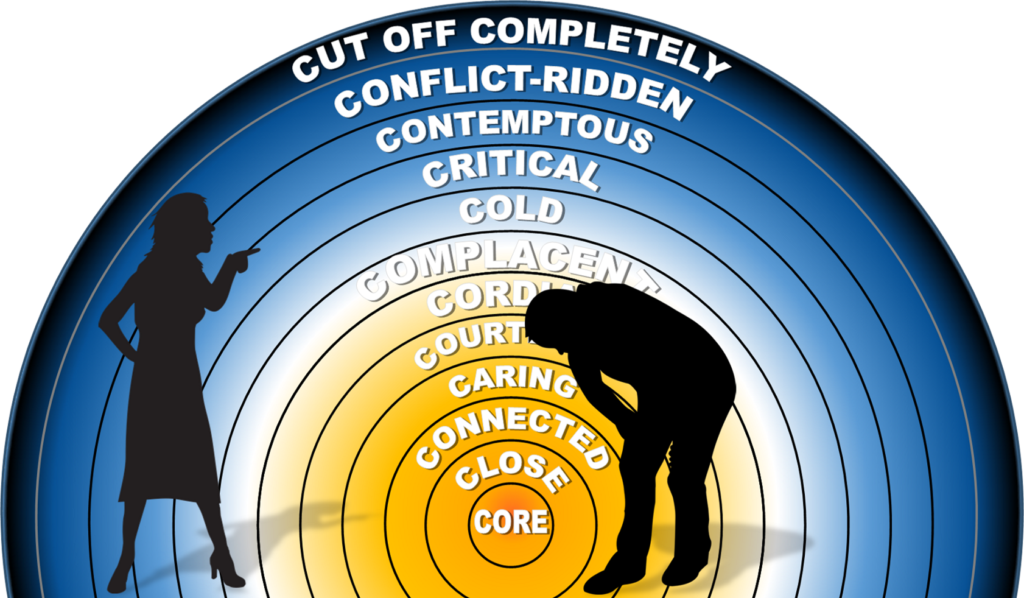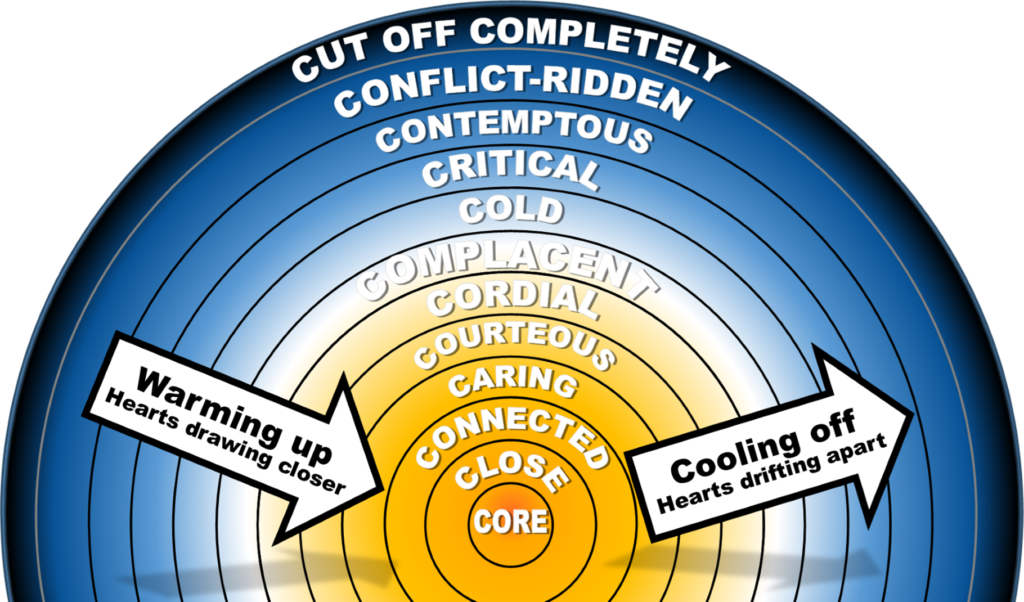 In my past two posts, I framed relationships as having temperatures. Part 1 talked about what factors cause relationships to either warm up or cool down, and Part 2 told what to do if others choose to remain cold despite your attempts at warmth.
In my past two posts, I framed relationships as having temperatures. Part 1 talked about what factors cause relationships to either warm up or cool down, and Part 2 told what to do if others choose to remain cold despite your attempts at warmth.
In this post, I will define each of the twelve temperature increments on my graphic. I’ll explain the warmer ones first, followed by the colder ones. I’ll begin each grouping with the absence of temperature–what I call Complacent.
Here’s how I describe the increasing levels of warmth in relationships.
COMPLACENT Again, this level is neither warm nor cool. Indifference or ambivalence characterizes such relationships. No positive or negative interactions or feelings exist. This category can describe people with whom we have little or no interaction, such as neighbors we haven’t met. To move to the next level of warmness often begins with introducing ourselves and learning names.
CORDIAL This is the level where people are polite and respectful toward each other, but there is still a formality to the interactions. Cordiality is seen in the pleasant conversations between people who just met–involving an ever-so-slight amount of relational warmth. Moving to the next level requires viewing the other person as someone to bless.
COURTEOUS Here, the people show gracious consideration toward one another involving small acts of kindness that have minimal cost. Shoveling a neighbor’s driveway is an example of being courteous. Moving to the next level of warmth requires becoming aware of the particular needs of others.
CARING In this level, people demonstrate a greater level of kindness through costlier actions, empathy, and personalized compliments. Examples would be bringing over a meal for someone in crisis, helping someone move, offering a listening ear to a neighbor who needs to vent, or building up someone who feels like a failure. Wouldn’t the world be a better place if people were better at caring! And think of the influence we would have if we were better at this; people don’t care what you know until they know that you care. With many of the people in our lives, this level is as warm as we need to get. But for others, we will have even warmer relationships.
CONNECTED People in this category find community with others, often through group involvement, shared experiences, geographical proximity, ethnic backgrounds, and shared interests such as sports, hobbies, politics, beliefs, or church involvement. Such connections offer an antidote for loneliness and provide a sense of belonging. In connected relationships, it is safe to share opinions, values, and passions. Here, we enjoy camaraderie and a sense of we, not just me. People can feel connected with dozens and even hundreds of people; however, the final two levels necessarily involve much smaller numbers of people.
CLOSE This level describes relationships where there is a much higher level of vulnerability, safety, and trust. The people within this level find it safe to share difficult experiences, controversial views, emotions, hurts, fears, and dreams in the context of unconditional support and encouragement. Bible studies, accountability or support groups, support groups, and close teams often provide such close connections. We usually have only a handful or two of family and friends within this category.
CORE The most intimate relationships belong in this final category which is characterized by complete vulnerability, transparency, and support. These are the closest of friends and they enjoy safe, secure, attachment bonds. A person may have one or two core people in their lives and spouses in the healthiest of marriages relate at this level. For Christians, our relationship with God should also be at this level of intimacy.
And here’s how I describe the levels of increasing coldness.
COMPLACENT This level is neither warm nor cool. Indifference or ambivalence characterizes such relationships. No positive or negative feelings or interactions exist. This category can describe people with whom we have little or no interaction, such as neighbors we haven’t met.
COLD This is the first level where the interactions are chilly. People here are stand-offish or resort to brief answers to questions without elaboration. Sarcasm, eye-rolling, and sighs of exasperation may also occur in cold relationships. When people are cold toward us, it is difficult–but important–not to reciprocate; returning coldness for coldness serves only to propel us toward the next level.
CRITICAL Relationships at this level contain a lot of criticism, focusing on the other person’s failures. Harsh words are spoken, flaws are highlighted, complaints are levied, and disparaging words are shared. It is the opposite of encouragement and there is no granting any “benefit of the doubt.” When people are critical of us, it is nearly impossible not to strike back with criticism, but we are wise when we listen to the criticism, looking for kernels of truth that we might learn from. But, instead, if we deflect their criticisms and turn the attention back to their flaws, we only lead the relationship closer toward the next level of coldness.
CONTEMPTUOUS Criticism eventually grows into an internal attitude of contempt, which dwells under the surface with feelings of disdain and resentment. Contempt is sometimes expressed through external cutting remarks and negative generalizations. According to acclaimed marriage researcher, Dr. John Gottman, contempt between spouses is the number one predictor of divorce. When we harbor contempt toward another, all compassion is gone. We would be wise to check our attitudes and look for the image of God in others. But, instead, if we keep viewing them with contempt, we are heading toward the added coldness of the next level.
CONFLICT-RIDDEN By this point, the gloves have completely come off–wounding the other is the primary goal. Relationships in this level are characterized by constant bickering, arguments, shutting down the other, deflection, blame-shifting, avoidance of responsibility, and unforgiveness. The goal is to defeat them at all costs, opposing every statement, getting the last word in, proving them wrong, and cutting them down. If we are wise, we will become convicted about the damage we’re causing and will see the importance of standing down. If we don’t, the only option will be the final level.
CUT OFF COMPLETELY These relationships are so icy cold that one or both parties have cut the other off completely. The hurts are so deep that the parties refuse to interact at all. [Note: in abusive relationships, this level may be the only safe option. But in all other situations, see my previous post on how to warm things up.]
_________________________________________________________________________________________
Subscribe to my blog to receive notifications when I post.
[subscribe2]





